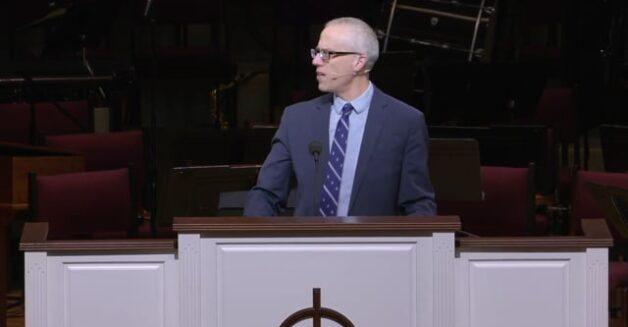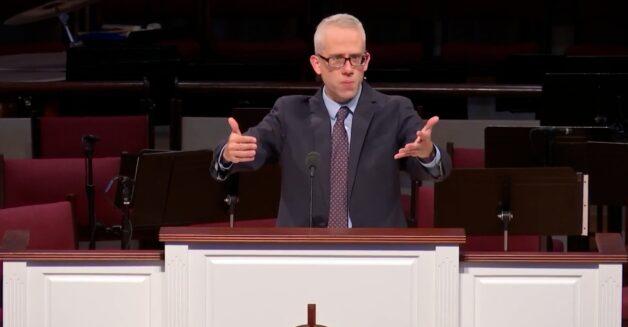Who was responsible for the death of Christ? There is more than one true thing we can (and should) say in response to that question.
We can think about the cross as the place of substitution and affirm that Christ “was pierced for our transgressions; he was crushed for our iniquities” (Isa. 53:5).
We can think about the cross as a propitiatory sacrifice and affirm that “It was the will of the Lord to crush him” (Isa. 53:10).
We can also think about the cross as the place of the Son’s obedience and affirm that Christ freely laid down his life (John 10:18) and endured the cross for the joy set before him (Heb. 12:2).
All three of these are true. Behind the death on the cross is the Father, the Son, and you and me.
We should be careful, however, in how we talk about these realities.
The Bible never speaks of the Father killing the Son, let alone of the Son killing himself. We must be careful not to describe the cross in ways that imply the Father or the Son were guilty of sin.
We must also be careful not to make human sin the decisive factor in Christ’s death (which is why I always add a footnote in my brain when we sing “it was my sin that held him there.”).
So long as we are careful, and put the necessary caveats and qualifications in place, we can say that the Father’s will, the Son’s obedience, and our sins all played a part in making the crucifixion happen.
Sharpening the Question
But who killed Jesus?
The questioner wants to know, not just in a theological sense or in an ultimate sense, but in an immediate earthly sense, who killed Israel’s Messiah?
We know that Roman soldiers did the literal work of nailing Jesus to the cross (Mark 15:24).
Moreover, the book of Acts records that under the sovereignty of God “both Herod and Pontius Pilate, along with the Gentiles and the peoples of Israel” were responsible for Jesus’s death (Acts 4:27–28).
Even in a strictly earthly sense, then, there were many people who could be blamed for killing Jesus.
But what about the Jews? Isn’t it the case that the Bible repeatedly affirms that the Jews as a people were responsible—perhaps uniquely responsible—for killing Jesus? After all, the crowd in Jerusalem, in clamoring for Jesus to be crucified and for Barabbas to go free, exclaimed, “His blood be on us, and on our children” (Matt. 27:25). Even if the statement is unpopular, aren’t we obliged to say with the Bible that the Jews killed Jesus?
The short answer is: It depends.
The longer answer is: As a generic statement without any other context, we should not say “the Jews killed Jesus.”
Let’s start with the limited sense in which someone might accurately say the Jews killed Jesus.
The Gospel of John speaks of “the Jews” crying out against Jesus (John 18:38–40) and “the Jews” calling on Pilate to crucify Jesus (John 19:14–16). If you were preaching through John, you might say something at some point about the Jews rejecting and crucifying their Messiah (John 1:11). But John’s language is surely not meant to be an indictment against every Jewish person, for John himself was Jewish and, of course, Jesus was Jewish too. One can hardly make the Gospel of John into an antisemitic text when the whole point of the book is to believe in and worship the King of the Jews (John 20:24–31). The footnote in the ESV at John 9:18 is correct when it explains that the Greek Ioudaioi (the Jews) “refers here to religious leaders and others under their influence, in that time.”
The Jews and Corporate Responsibility
While it is true that some biblical texts speak of specific Jews, in a specific context, bearing responsibility for Jesus’s death, the Bible does not teach that the Jews as a people killed Jesus. I’ve covered some of this ground before in sketching a theology of corporate responsibility, but it is necessary to look at some of the same arguments again as they relate specifically to the Jews.
A quick overview of the book of Acts proves that while many of the Jews in Jerusalem during the Passion Week bore special responsibility for the death of Jesus, the Jews as a people were not held responsible for Jesus’s death in any unique way.
In Acts 2, Peter charged the “men of Judea and all who dwell in Jerusalem” (Acts 2:14) with crucifying Jesus (Acts 2:23, 36). Remember, Peter is speaking in Jerusalem to those who live in Jerusalem. As those present in Jerusalem during Passion Week, these Jews bore some responsibility for Jesus’s death.
Likewise, Peter charged the men of Israel gathered at Solomon’s Portico with delivering Jesus over and denying him in the presence of Pilate (Acts 3:11–16). While we don’t know if every single person in the Acts 3 crowd had chosen Barabbas over Christ, Peter did not hesitate to lay the blame for the crucifixion at their feet. Most, if not all of them, had played an active role in the events leading up to Jesus’s death. This was a sin in need of repentance (Acts 3:19–20).
We see the same approach in Acts 4:10 and Acts 5:30 where Peter and John charge the council (i.e., the Sanhedrin) with killing Jesus.
From these texts we can see that the Apostles held the Jewish leaders and the Jews in Jerusalem at that time responsible—along with other lawless men (Acts 2:23; 4:27)—for killing Jesus.
It’s passages like these that lead some people to insist in a general way that “the Jews killed Jesus.” But unless we mean “the Jews in Jerusalem who stood before Pilate,” the statement is misleading at best and pejorative at worst. Surely, Peter and John did not mean to indict an entire ethnic group (either at that time or for all time), for they were also Jews. It is striking that they did not say we killed Jesus, as if all Jews were responsible for hanging Jesus on a tree, but instead they spoke of the one whom “you crucified and killed” (Acts 2:23, emphasis added). Clearly, Peter and John did not think they killed Jesus (even if they would affirm in a theological sense that Christ died for the sins of the ungodly).
There is no evidence that the Apostles thought all the Jews, everywhere and into the future, had a hand in killing Jesus. Look at what happens in Acts once the action leaves Jerusalem.
In speaking to Cornelius (a Gentile), Peter relays that “they” put Jesus to death by hanging him on a tree (Acts 10:39). Given that the nearest antecedent refers to what Jesus did “in Jerusalem,” it seems likely that the “they” Peter has in mind are the Jews who rejected Jesus in Judea and the ruling class in Jerusalem. This interpretation finds confirmation in a similar statement from Paul a few chapters later.
In Acts 13:27, Paul tells the crowd in Pisidian Antioch that “those who live in Jerusalem and their rulers” condemned Jesus. This speech is especially important because Paul is talking mainly to Jews (Acts 13:16, 26). Note that Paul does not blame the Jews in Pisidian Antioch for the actions of the Jews in Jerusalem. There is no language of “whom you crucified” when addressing Jews in another part of the Roman Empire.
What we see from Paul in Acts 13 is a consistent pattern in the rest of the book.
Paul does not charge the Jews in Thessalonica or Berea with killing Jesus (Acts 17), nor the Jews in Corinth (Acts 18) or in Ephesus (Acts 19). In fact, when Paul returns to Jerusalem years after the crucifixion, he does not accuse the Jews there of killing Jesus either. He does not even charge the council with that crime (see Acts 23). The rest of the Jews in the book of Acts still had to repent of their sins, but outside of Jerusalem, and after the specific time of the crucifixion, the Jews were not charged with killing the Messiah.
Conclusion
So did the Jews kill Jesus?
In a limited sense, we can say with Scripture that the Jewish leaders and the crowd before Pilate delivered up Jesus to be crucified and killed by the hands of lawless men.
At the same time, we should not derive from this specific context a blanket statement about the Jews as a people. When someone today says “the Jews killed Jesus” or is eager to defend that statement—without any other context or any caveats—we are right to wonder what is behind the desire to speak this way. It is certainly not the way the Bible speaks about the Jews in general. While the Apostles considered the Jews in Jerusalem at the time of the crucifixion uniquely responsible for Jesus’s death, this culpability did not extend to every Jew alive at that time or to every Jew who would live in Jerusalem thereafter.
Corporate responsibility does not automatically track along the lines of race, religion, or ethnicity. The Jews as a people group are not responsible for the specific sins committed by specific Jews at a specific time and place in history. The message we ought to be eager to declare as Christians is not who killed Jesus, but that through Jesus—the son of Abraham, the son of David, the son of Mary—all people, Jews and Gentiles, can be saved from their sins and have life in his name (John 20:31).
Kevin DeYoung is the senior pastor at Christ Covenant Church (PCA) in Matthews, North Carolina and associate professor of systematic theology at Reformed Theological Seminary.





